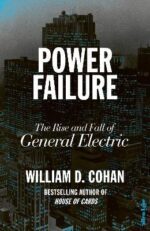Power Failure: The Rise and Fall of an American Icon
The dramatic rise-and unimaginable fall-of America’s most iconic corporation. -William D. Cohan No company embodied American ingenuity, innovation, and industrial power more spectacularly and more consistently than the General Electric Company. GE once developed and manufactured many of the inventions we take for granted today, nearly everything from the lightbulb to the jet engine. GE also built a cult of financial and leadership success envied across the globe and became the world’s most valuable and most admired company. But even at the height of its prestige and influence, cracks were forming in its formidable foundation. In a masterful re-appraisal of a company that once claimed to “bring good things to life,” William D. Cohan argues that the incredible story of GE’s rise and fall is not only a paragon, but also a prism through which we can better understand American capitalism. Beginning with its founding, innovations, and exponential growth through acquisitions and mergers, Cohan plumbs the depths of GE’s storied management culture, its pioneering doctrine of shareholder value, and its seemingly hidden blind spots, to reveal that GE wasn’t immune from the hubris and avoidable mistakes suffered by many other corporations. In Power Failure, Cohan punctures the myth of GE, exploring in a rich narrative how a once-great company wound up broken and in tatters-a cautionary tale for the ages.










